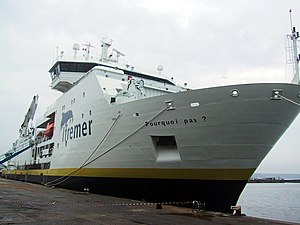French ship Pourquoi Pas? (2005)

Pourquoi Pas? in Brest after her delivery
|
|
| History | |
|---|---|
|
|
|
| Namesake: | Pourquoi Pas ? IV |
| Launched: | 14 October 2004 |
| General characteristics | |
| Class and type: | research vessel |
| Displacement: | 6600 tonnes |
| Length: | 107 m (351 ft) |
| Beam: | 20 m (66 ft) |
| Draught: | 6.9 m (23 ft) |
| Propulsion: | Diesel-electric with a Class II dynamic positioning system. |
| Speed: | 14.5 knots (26.9 km/h; 16.7 mph) |
| Endurance: | 64 days at 11 knots |
| Boats & landing craft carried: |
ROV |
| Capacity: | 1000 m² laboratory, 40 scientists |
| Complement: | 18 to 33 men |
| Sensors and processing systems: |
|
Pourquoi Pas ? (English: Why Not?) is a research vessel built in Saint-Nazaire, France by Alstom Marine for IFREMER and the French Navy. She is currently primarily used by SHOM (Service hydrographique et océanographique de la Marine). She was ordered in December 2002 and completed in July 2005. The 66 million euro cost was financed by IFREMER (55%) and the French Navy (45%). She is named after explorer Jean-Baptiste Charcot's famous ship.
Pourquoi Pas? is used 150 days per year by the French Navy and 180 days per year by IFREMER. She was designed for hydrography, geoscience, and physical, chemical and biological oceanography, as well as to launch small submarines such as the manned submersible Nautile and the ROV Victor 6000.
Notably, Pourquoi Pas? has been used for the 2007 deployment and connection operations for the ANTARES neutrino telescope.
In 2008, Pourquoi Pas? was used for the initial testing and operations of the PERISCOP, a pressurized deep sea fish recovery device.
In June 2009 she assisted in the recovery of Air France Flight 447.
...
Wikipedia
